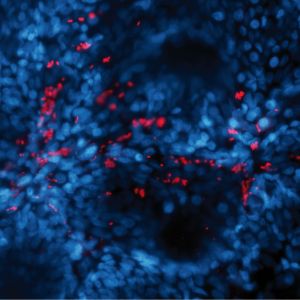Un grupo del Consejo Superior de Investigaciones Científicas dirigido por el investigador Luis Ángel Fernández acaba de publicar en la revista científica Plos Pathogens los prometedores resultados de una estrategia dirigida al bloqueo de la entrada de la bacteria en el epitelio intestinal. Fernández, del Centro Nacional de Biotecnología (CNB-CSIC) explica cómo han utilizado la capacidad de la bacteria de unirse al epitelio intestinal como base para frenar la infección. “Al comienzo de la infección la bacteria inyecta un receptor en la membrana de las células epiteliales en el intestino y lo utiliza para unirse fuertemente a estas células. Nosotros hemos obtenido en el laboratorio unos anticuerpos de pequeño tamaño, llamados nanoanticuerpos ("nanobodies" en inglés), que se unen a este receptor con muy alta afinidad, de manera que se produce una competición por el receptor entre el nanoanticuerpo y la bacteria, lo que acaba impidiendo que la bacteria se una a las células intestinales".
David Ruano-Gallego, primer autor del trabajo, detalla cómo a pesar de la falta de modelos animales donde investigar esta infección, la colaboración con el Centro de Bacteriología Molecular e Infección del Imperial College de Londres y con el Instituto de Biociencias Quadram de Norwich, en el Reino Unido, “nos ha permitido comprobar en biopsias de colón de donantes sanos que estos nanoanticuerpos tienen la capacidad de bloquear la infección también en tejidos complejos como la mucosa del colon, un resultado prometedor para desarrollar futuras estrategias que eliminen rápidamente a la bacteria durante la infección y protejan al epitelio de nuevas infecciones por EHEC”.
Mas información:
A nanobody targeting the translocated intimin receptor inhibits the attachment of enterohemorrhagic E. coli to human colonic mucosa.
Ruano-Gallego D, Yara DA, Di Ianni L, Frankel G, Schüller S, Fernández LÁ.
PLoS Pathog. 2019 Aug 29;15(8):e1008031. doi: 10.1371/journal.ppat.1008031.






